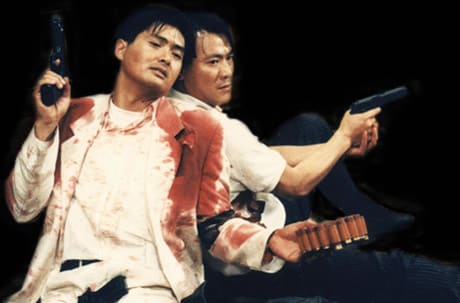"I think there's a lot of misunderstanding in this world. I mean, why is [there so much] hatred between people? Why are people killing each other? It's all about lack of understanding." This statement by director John Woo about his 1989 film The Killer, in its own simplistic and earnest manner, goes a long way to summing up the film's appeal. By general consensus one of the greatest action films of all time, and one of the most famous movies of the Hong Kong New Wave, Woo's film has the passion of Greek tragedy filtered through the kitsch of Hollywood gangster pictures and the broad, dynamic strokes of a good comic book. Loyalty, compassion, brotherhood, honour, these are concepts that aren't analyzed in Woo's films so much as blown up, celebrated, and fetishized. Chow Yun-Fat is the titular killer, an assassin whose stray bullet accidentally blinds innocent nightclub performer Sally Yeh during a hit. Overwhelmed by guilt, Chow befriends her without revealing his true identity and takes on one last assignment to pay for a vision operation. Alas, things go awry when Chow's bosses betray him, and he forms an unlikely alliance with a disillusioned cop (Danny Lee). The two men develop a bond depicted in such an intensely emotional way that American critics have sometimes called it homoerotic ― the heavy emotional charge is the only explanation for why the original American distributors advertised this as "An Action Comedy by John Woo." And then there's the action. Oh, the action! From the incredibly suspenseful harbour-to-hospital chase scene to the mind-boggling final church shootout, Woo in his prime was simply the best in the business. Why do macho swagger, religious iconography and aesthetically pleasing ultra-violence work in Woo's films but fail so spectacularly in, say, Troy Duffy's The Boondock Saints II: All Saints Day? Perhaps because there's a genuine sense of morality beneath all the bloodshed no matter how naive, and perhaps because Woo has something that so many of his imitators lack: sincerity. This "ultimate edition" two-disc set from the Weinstein Company's Dragon Dynasty label doesn't quite live up to its name, lacking the Woo commentaries from the earlier Criterion and Fox Lorber editions, and with the image quality becoming pixelated in heavier action scenes. Still, there are some worthwhile John Woo Q&As, a documentary about the Hong Kong shooting locations, several short deleted scenes, and trailers for other Woo films. Any DVD that whets the appetite for another viewing of Woo's awesometastic Hard-Boiled (1992) is definitely doing something right.
(Alliance)The Killer
John Woo

BY Will SloanPublished Mar 30, 2010